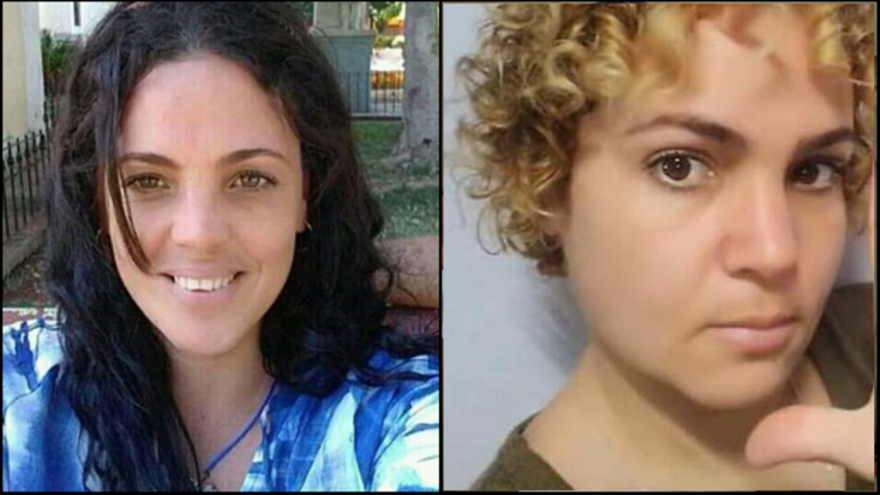
![]() 14ymedio, Havana, September 20, 2022–Writer María Cristina Garrido, her sister Angélica, and activist Lizandra Góngora, arrested for their participation in the 11J protests [11 July 2021], announced on Tuesday their refusal to wear common prisoner uniforms and declared the start of a hunger strike.
14ymedio, Havana, September 20, 2022–Writer María Cristina Garrido, her sister Angélica, and activist Lizandra Góngora, arrested for their participation in the 11J protests [11 July 2021], announced on Tuesday their refusal to wear common prisoner uniforms and declared the start of a hunger strike.
The prisoners signed a note from the women’s prison in Guatao, Havana, in which they demand their freedom and reiterate “the poor health the three of us are experiencing.” They added that, for this reason, their lives are at risk and if anything should happen to them, “all justice will befall on their repressors.” The note concludes with a “greeting of resistance from this cold shadow.”
Luis Pérez Rodríguez, Angélica’s husband, told 14ymedio that the three young women are “plantadas*” and have refused prison food. The issue, he explained, is that the decision could bring an additional reprisal by the authorities.
They could isolate them for more than a week, which would mean that their family members will not be able to take them food or other assistance. “Meaning, it would be ten days of complete hunger,” says Pérez Rodríguez.
The three women have not been the only ones to suffer the harshness of the regime against those arrested following 11J. Rowland Jesús Castillo, one of the minors prosecuted for his participation in the protests has received, suddenly, a hardening of his sentence.
According to activist Carolina Barrero, the young man, who had been released from prison in May to serve his sentence in a labor camp, will return to prison on October 6th.
The Court for Crimes Against State Security of Havana’s Provincial Tribunal, explained Barrero, decided that Castillo must be admitted on that day to the Jóvenes de Occidente prison, after modifying his sentence to “correctional with internment.” At that prison, where many of the 11J protesters are being held, he must remain for five years.
Rowland Castillo is one of the “children of 11J”, accused of the crime of sedition, one of the most serious in the Cuban Criminal Code, which authorities used to prosecute those arrested during the protests. Since his arrest, his mother Yudinela Castro Pérez, has staunchly defended her son’s innocence. Last March the woman, who also has leukemia, had to be hospitalized following a suicide attempt.
The young man was initially sentenced to 18 years in prison, but was released later in May along with other detainees. For demanding his release, his father, Ángel Rolando Castillo Sánchez, was sentenced to two years in jail during a summary trial.
In the courts requirements issued to Rowland Castillo, he was informed that he will perform agricultural labor and will be living in a camp; for this reason he is ordered to bring some supplies such as a towel, sheet, a bucket and appropriate clothing, “with a view toward guaranteeing the best living conditions for himself, since the center cannot provide these.”
“Prison, forced labor and indoctrination, that is how the regime punishes young people for their desire for democratic change, widely expressed during the protests in 2021 and 2022,” stated Carolina Barrero in her publication.
Meanwhile, Estelvina Rodríguez, mother of another 11J prisoner, Dayron Martín Rodríguez, a patient diagnosed with schizophrenia, demanded his release at the United Nations.
In a video shared on Monday by NGO Freedom House at the UN Working Group on Arbitrary Detentions, Estelvina Rodríguez stated that Dayron was “one of the many young people who went out peacefully to protest in Havana demanding freedom, a change of government, and economic improvements,” that 11J. For that, the regime accused him of an attack on state security.
The tribunals imposed upon Martín Rodríguez one of the longest sentences for his participation in the protests in the emblematic corner of Toyo in Havana, no less than 30 years in prison. His mother’s pleas for the risk he faces due to his illness were of no use.
“My son’s life is in danger, for being a schizophrenia patient who had previously been admitted to a mental health facility for attempting suicide,” said Rodríguez in her statement on Monday.
She added, “He must be released, for he is innocent. At the very least, we implore for him to be transferred to a medical center equipped to guarantee his health. We are worried that in prison he might attempt suicide due to his mental condition.”
Rodríguez highlighted that Dayron is not being provided with the conditions nor the medications needed to treat his illness and insisted, “I implore this United Nations committee to intercede with the Cuban government for my son’s health and to initiate an investigation into the true cause of his detention.”
*Translator’s note: A ‘plantado’ — literally ’planted’ — is a term with a long history in Cuba and is used to describe a political prisoner who refuses to cooperate in any way with their incarceration. “Plantada” is the feminine.
Translated by: Silvia Suárez
____________
COLLABORATE WITH OUR WORK: The 14ymedio team is committed to practicing serious journalism that reflects Cuba’s reality in all its depth. Thank you for joining us on this long journey. We invite you to continue supporting us by becoming a member of 14ymedio now. Together we can continue transforming journalism in Cuba.
